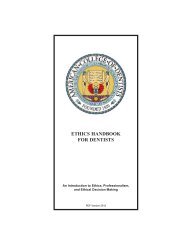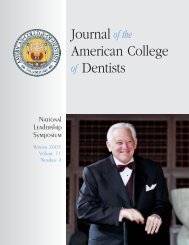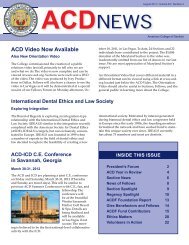Journal of the American College of Dentists
Journal of the American College of Dentists
Journal of the American College of Dentists
Create successful ePaper yourself
Turn your PDF publications into a flip-book with our unique Google optimized e-Paper software.
Students’ Views on Ethics<br />
20<br />
I feel Mr. E does not understand<br />
<strong>the</strong> gravity <strong>of</strong> his condition. Not only is<br />
Mr. E neglecting his oral health, but he<br />
has informed me that he does not<br />
regularly see a physician and seldom<br />
takes medication for any ailments.<br />
Despite his actions, I believe that Mr. E’s<br />
credentials are genuine and that he is<br />
quite an intelligent man.<br />
In <strong>the</strong> past year, Mr. E has come in<br />
for several treatment-planning sessions.<br />
As he has called to discuss his painful<br />
teeth, I have made appointments for him<br />
to have <strong>the</strong>m extracted. It has been a<br />
long and frustrating process convincing<br />
Mr. E to extract his remaining teeth after<br />
he recently invested so much time and<br />
money into crowns and veneers placed<br />
by previous University <strong>of</strong> Washington<br />
dental students.<br />
Washington State Laws<br />
RCW 74.34 describes <strong>the</strong> responsibility<br />
<strong>of</strong> dentists and o<strong>the</strong>rs to report possible<br />
abuse <strong>of</strong> vulnerable adults. Although<br />
Mr. E lives on his own, I am concerned<br />
that he may not be completely capable<br />
<strong>of</strong> caring for himself. Mr. E’s diet consists<br />
primarily <strong>of</strong> candy, ice cream, canned<br />
soups, and alcohol. Mr. E does not<br />
want to ask his son for help in matters<br />
regarding his health care. I firmly<br />
believe that Mr. E is a vulnerable adult<br />
and is currently living in a state <strong>of</strong><br />
“self-neglect,” compromising his health<br />
by masking his dental problems with<br />
sleeping medications and alcohol.<br />
Community members, regardless <strong>of</strong> age,<br />
make poor decisions regarding <strong>the</strong>ir<br />
health care. When is it <strong>the</strong> dentist’s<br />
responsibility to alert social services<br />
when an elder falls into this category?<br />
RCW 18.130.180, Section 4 describes<br />
incompetence, negligence, or malpractice<br />
which results in injury to a patient<br />
or which creates an unreasonable risk<br />
that a patient may be harmed. Mr. E’s<br />
previous student dentist may have been<br />
demonstrating negligence or incompetence<br />
if he or she had performed <strong>the</strong><br />
extensive dental work on Mr. E knowing<br />
that he is not fully capable <strong>of</strong> properly<br />
managing his oral hygiene. A dentist<br />
must be aware <strong>of</strong> a patient’s ability to<br />
maintain dental restorations. Mr. E’s poor<br />
oral hygiene, diet, vision, and manual<br />
dexterity should have been taken into<br />
consideration before <strong>the</strong> previous dentist<br />
placed porcelain crowns and veneers.<br />
Had <strong>the</strong>se circumstances been evident<br />
during <strong>the</strong> previous treatments, Mr. E’s<br />
prior dental student may be seen as<br />
creating unreasonable health risks to<br />
Mr. E, thus demonstrating negligence.<br />
RCW 18.130.180, Section 16 describes<br />
misconduct resulting in promotion for<br />
personal gain <strong>of</strong> any unnecessary or<br />
inefficacious drug, device, treatment,<br />
procedure, or service. The previous<br />
dental student would have violated this<br />
section if <strong>the</strong> treatment for Mr. E was<br />
completed in order to satisfy clinical<br />
requirements while disregarding Mr. E’s<br />
need or indication for such treatment.<br />
ADA Code <strong>of</strong> Ethics<br />
Patient Autonomy: Mr. E’s thought<br />
process is different from what I would<br />
want for myself if I were in his position.<br />
However, Mr. E seems to know what he<br />
does and does not want. I have spent<br />
many hours in treatment-planning<br />
sessions talking to him, explaining his<br />
needs and presenting him with possible<br />
treatment options. We have discussed<br />
<strong>the</strong> possible outcomes and associated<br />
costs <strong>of</strong> various treatments. The time I<br />
have spent with Mr. E has allowed him<br />
to accept that he needs a comprehensive<br />
treatment plan that addresses his whole<br />
mouth while preserving his general<br />
health. Such a plan will avoid trying to<br />
save his remaining teeth with root canals,<br />
buildups, and new crowns while he is<br />
unable to maintain proper oral hygiene.<br />
Mr. E’s ability to provide informed<br />
consent is uncertain. We spent many<br />
appointments reviewing <strong>the</strong> hopeless<br />
prognosis for his teeth and his need for<br />
a denture. He frequently leaves appointments<br />
saying, “Well, you’ve surely given<br />
me a lot to think about.” He calls several<br />
days later asking about crowns and <strong>the</strong><br />
possibility for dental treatment o<strong>the</strong>r<br />
than what we had discussed. Being that<br />
Mr. E has had such extensive dental<br />
treatment in <strong>the</strong> past, he may simply be<br />
upset that he must extract his teeth and<br />
is trying to avoid this plan.<br />
In order to abide by <strong>the</strong> principle<br />
<strong>of</strong> confidentiality (Section 1B) I have<br />
avoided discussing <strong>the</strong> complications <strong>of</strong><br />
Mr. E’s case with <strong>the</strong> gentleman who<br />
occasionally brings Mr. E to his appointments.<br />
This gentleman’s daughter is a<br />
nurse and has called <strong>the</strong> dental school<br />
in <strong>the</strong> past to inquire about Mr. E’s care.<br />
She did not get in contact with me;<br />
however, Mr. E may allow me to talk<br />
with her to coordinate <strong>the</strong> treatment<br />
presentation appointment so that he can<br />
be properly cared for while he is healing<br />
from oral surgery.<br />
When does a dentist decide if a person<br />
is unfit to make decisions for himself or<br />
herself? Just because someone is elderly,<br />
should his or her ability to make mistakes<br />
and poor judgment calls be limited?<br />
Younger adults make poor decisions<br />
constantly; however, <strong>the</strong>y are allowed<br />
autonomy to follow <strong>the</strong>ir own desires.<br />
Nonmaleficence: It may be easy to<br />
assume that <strong>the</strong> student dentist responsible<br />
for <strong>the</strong> expensive dental treatment<br />
Mr. E has had in <strong>the</strong> past was being<br />
negligent and causing harm to Mr. E.<br />
Alternatively, <strong>the</strong> patient may have been<br />
more diligent about oral hygiene in <strong>the</strong><br />
2011 Volume 78, Number 4





